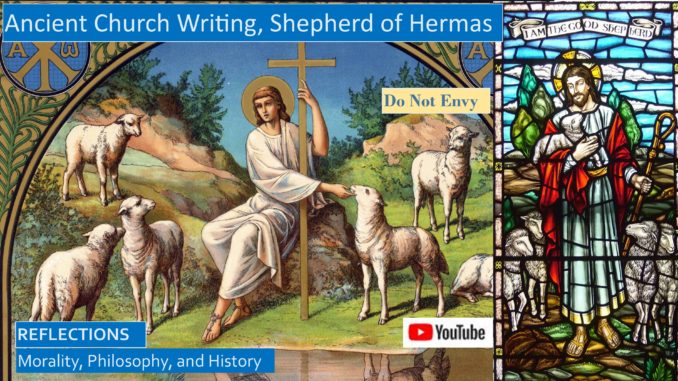
The Shepherd of Hermas, also known as the Pastor of Hermas, was regarded by some early Christians as Scripture. A consensus was reached that only books that were apostolic would be included in the canon, and the Shepherd was written in the generations after the apostles.[1] But it was recommended by many for profitable spiritual reading, and reading this work is profitable still, for the message of Hermas runs counter to the prosperity gospel, condemning luxurious living. He has a vision in Similitude 6 of a false shepherd, “an angel of luxury and deceit,” whose sheep “were feeding luxuriously and riotously, merrily skipping about,” “deceived by wicked desires, forgetting the commandments of the Living God.” Those who are lost in luxurious living, spending their time eating “the richest delicacies and in drunken revels,” cannot “return to life through repentance, because they are adding to their sins, and blaspheming the name of the Lord.”
The YouTube video includes some introductory material and additional commandments not included in this blog:
The best eBooks for the Ante-Nicene Fathers can be purchased at https://www.christianbook.com
The Shepherd of Hermas is referenced in the Catholic Catechism in the section on Do Not Envy.
In the first sentence we learn from the narrator that Hermas is a former slave bought by a lovely lady named Rhoda, who he came to love as a sister. Once he saw her bathing in a river and he reached his hand to help her out of the water and was struck by her beauty. That was that, nothing more, and sometime after. when he had fallen asleep he saw his first vision. In all his visions the Spirit takes him to a pathless place across a river where he kneels to pray for the forgiveness of his sins. In his first vision the lovely lady speaks to him from the sky above, and accuses him for his sin of beholding. He objects, says he has always respected her, but she smiles and responds, “the desire of wickedness arose within your heart, a great sin, for the thoughts of a righteous man should be righteous.” She bids him to pray to God to heal him of his sins.
The heavens shut, and Hermas hails an old woman he sees sitting in a large chair nearby, and she asks him why he is so downcast. He tells her of his rebuke, and she gently responds, “it is a wicked and horrible wish in a chaste and well-tried spirit to desire an evil deed; and especially for you, Hermas, you who avoids wicked desires, full simplicity, totally without guile.” This reminds us of the story of David and Bathsheba, sin is so devastating to the faithful servant of God.
There are many other visions, the vision in Chapter VIII describes seven women around a tower symbolic of the Church. The first woman, Faith, clasping her hands, saves the elect, and her daughter is Self-restraint, the restraint from evil desire to inherit eternal life. From Faith comes Self-restraint, and from her comes the qualities of the other five women, Simplicity, leading to Guilelessness, to Chastity, Intelligence, and Love. “Whoever devotes himself to these, holding fast to their works, shall have his dwelling in the Tower of the Church with the saints of God.”
In his last vision he sees a radiant shepherd with white goat’s skin sent by the angels to dictate to him the commandments and similitudes in the next two books of this work.[2]
THE COMMANDMENTS OF THE SHEPHERD
The first commandment is to believe in the One True God, “have faith in God and fear Him, exercising self-control, keeping His Commandments.”
The next commandment is referenced in the Catholic Catechism in the Commandment not to covet. “Be simple and guileless, be like the children who are ignorant of the wickedness that ruins the life of men. Speak evil of no-one, and do not revel to anyone who speaks evil of another.” You sin when you listen to slander, when you believe the slander you become a slanderer. “Slander is evil and an unsteady demon, never peaceful, always stirring up discord.” “Practice goodness,” “give to all,” “he who gives is guiltless.”
“Love the truth,” speak only the truth, for those “who lie deny the Lord and rob Him.” When we sin harming our neighbor we also sin against God.
The next commandment recited by the shepherd is to be chaste, remember your wife, never let the thought of cheating enter your mind, always be faithful to her in your heart and in your soul and in your deeds.
Then our Hermas asks the Shepherd what a man should do if his wife was guilty of adultery but did not want to repent and did not want to end the affair. The first bit of advice from the shepherd holds true today, doing nothing is not an option. “If the husband knows his wife has gone astray, and his wife will not repent, but persists in her fornication, and yet the husband continues to live with her, he is also guilty of her crime, and a sharer in her adultery.” We may balk at this moral condemnation of the jilted partner, but we must agree that this serious sin should not be condoned.
If she continues, “her husband should put her away, and remain by himself.” But if she repents, he needs to take her back, and he needs to be patient. “If the husband does not take her back, he sins, and brings a great sin upon himself, for he ought to take back a sinner who has repented.” We would add, a Christ forgave us. Furthermore, “in case the divorced wife may repent, the husband ought not to marry another, when his wife has been put away.”
But then the Shepherd says he should only forgive her once, and then discusses the general question of sin after baptism. The early Church was tough on this issue, converts had to complete a lengthy catechetical period of prayer and study before baptism, for you were only permitted one serious sin after baptism.
It was impossible for the Church to keep this level of discipline over the centuries, and as a consequence the Church has lost the deep sense of repentance necessary for salvation. The message to us is we should consider forgiving our wayward spouse at least once, giving them the benefit of the doubt, for perhaps they will reform, and you will never re-marry the perfect spouse.
Often we are confronted in life with difficult decisions, whether we should divorce a wayward spouse, whether we should put an elderly parent in a nursing, how tough we should be with a wayward child. What is most important is not so much what decision we make, although the decision matters deeply, but rather how we make the decision is important. What are our motivations?
Above all, we should not judge others who are forced to make these decisions. In the case of divorce we do not know the complete story. If there is serious physical abuse not divorcing may the sinful path.
In the next commandment the Shepherd advises, Be patient, do not be angry, patience and anger do not mix. Be patient and “the Holy Spirit that dwells in you will be pure.” Everyone prefers to live in a peaceful house, but nobody likes to live around outburst of anger. Anger repels the Holy Spirit, He may seek to fly away. “Patience is great and mighty and strong and calm, joyful, rejoicing, free from care, glorifying God at all times, lacking bitterness, dwelling in all who have complete faith.” But anger is the opposite of patience, “anger is foolish and fickle and senseless.” If you lack patience will be unable to obey any of the other commandments.
We are commanded to “Fear the Lord and keep his commandments,” to shun evil and do good. From faith comes “fear of the Lord, then love, concord, words of righteousness, truth, and patience.”
Hermas asks the shepherd which evil deeds he needs to avoid.” He answers, we should restrain ourselves “from adultery and fornication, from unlawful reveling, from wicked luxury, from indulgence in many kinds of food and the extravagance of riches, from boastfulness, haughtiness, and insolence, and lies, backbiting and hypocrisy, from the remembrance of wrong, and from all slander.” Here we have another slippery slope, where one sin leads to another, where selfishness leads to cruelty, where luxury and covetousness leads to serious sins.
The shepherd’s ninth commandment is we should “Pray to God without ceasing and with unwavering confidence.” “With all your heart turn to the Lord, ask Him without doubting, and you will know the multitude of His tender mercies, for He will never leave you, and will fulfill the request of your soul. For God is not like men, men who remember wrongs, for God does not remember your sins, and has compassion for His creatures.”
Is this commandment an ancient version of “name it and claim it”? Can we request from God anything our selfishness desires? This teaching has another important injunction, to FIRST “cleanse your heart from all the vanities of this world,” and ONLY THEN should bring your requests before the Lord, and “none of your requests will be denied which you make to the Lord without doubting.” “Do not cease to make the request of your soul, and you will obtain it.”
Should we be angry to God when He does not answer our prayers? “If you grow weary and waver in your request, blame yourself, and not Him who does not give to you.” “Doubting is the daughter of the devil.”
It is unfortunate that the shepherd does not further develop this discussion of prayer, for we have met many who are angry at God because He did not save him from sickness or struggles or impending divorce. Perhaps we should more often pray to God for strength to endure the trials of life rather than to shield us from them. But we should always pray, for all prayers prays with a good heart are heard, no matter how trivial the prayer may be. We pray, God, that are prayers be selfless prayers, prayers to strengthen our faith, hope and Love, that our prayers not be selfish.
The exact meaning of the next commandment which bids us to avoid grief, “the sister of doubt and anger,” is unclear. We have a clue from this warning: “when the doubting man attempts any deed, and fails it on account of his doubt, then griefs enters this man, grieving the Holy Spirit.” I would be interested if anyone can offer a suggestion as to what this section means. Perhaps it is simply a case where Greek words don’t map easily in English, particularly ancient Greek words whose exact meaning have been forgotten.
The twelfth and final commandment of the Shepherd is “we are to guard ourselves from wild and wicked desires which are difficult to tame.” Foremost among the desires we should contain “is the desire after another’s wife or husband, and after extravagance, and many useless dainties and drinks, and many other foolish luxuries; for all luxury is foolish and empty.” Instead, “put on the desire of righteousness, arming yourself with the Fear of the Lord, resisting evil desires.”
For those who Fear and Love the Lord these commandments are not burdensome. But for those who only talk about the Lord, but whose “hearts are hardened, who are far from the Lord, the commandments are hard and difficult.”[3]
THE SIMILITURES OF THE SHEPHERD
An interesting parable in the Similitudes, the last section of the Shepherd of Hermas, is the parable of the elm and the vine. The elm by itself bears no fruit. Although the vine by will bear fruit, the fruit is rotten when it is strung along the ground. But when the vine is hung on the branches of the elm it yields double fruit.
What is the meaning of the elm and the vine? The elm is “the rich man who has much wealth, but is poor in matters relating to the Lord, because he is so distracted about his riches, offering few confession and intercessions to the Lord, and those that he does offer are small and weak, having no power in Heaven. But when the rich man assists the poor in his necessities,” “the poor man intercedes for the rich man, giving thanks to God who bestows gifts upon him.” “Poor men interceding with the Lord on behalf of the rich, increase their (heavenly) riches; and the rich, aiding the poor in their necessities, satisfy their soul.” “Blessed are the rich who understand their riches are from the Lord,” and share them with the poor.[4]
The injunction that God helps those who helps themselves is not only not found anywhere in Scriptures, it is also an injunction that would be roundly condemned by Hermas. The belief that the poor are responsible for their poverty, and that the rich would harm them by helping them by fostering dependency is also totally foreign to the spirit of Hermas. Rather, Hermas teaches that the rich man must have compassion on the poor to gain treasures in heaven.
We need to be discerning reading the Shepherd of Hermas. Because it is not scriptural you do not bear the burden of faith to interpret everything in this discourse as gospel. Like many early Christian works that are not scriptural, when compared to Scriptures the Shepherd is not as carefully worded, fewer manuscripts have survived, and these fewer manuscripts have not been translated nearly as carefully as the Scriptures. A few passages are suspect. In particular, the Shepherd describes a vision of an angel that is the punishing shepherd whose flock are formerly merry sheep who were tended by the false shepherd of luxury and deceit. This “good” angel tosses his sheep into the brambles and thickets where they are trapped, unable to escape their torments. You can draw some positive lessons from this parable, but this vision may not be entirely helpful to many, particularly those who are enduring sufferings that are not entirely their fault.
[1] Henry Chadwick, The Early Church (New York: Dorset Press, 1967, 1986), pp. 42-44.
[2] The Pastor of Hermas, Book One, Visions, In the Ante-Nicene Fathers, Volume 2, translated by Rev F Crombie (Boston: Hendrickson Publishers, 1994, first published 1885), Book 1, pp. 9-19.
[3] The Pastor of Hermas, Book Two, Commandments, pp. 20-30.
[4] The Pastor of Hermas, Book Three, Similitudes, p. 32.

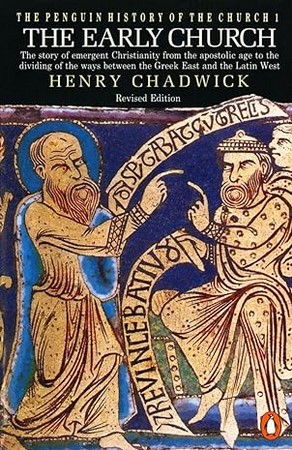
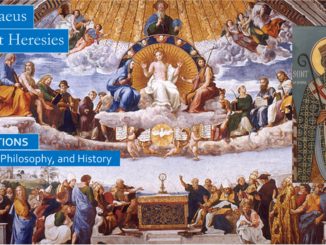
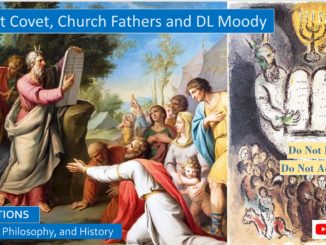
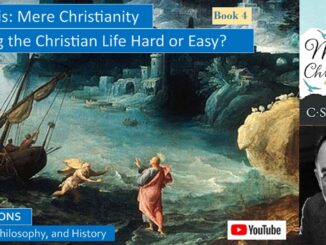
2 Trackbacks / Pingbacks